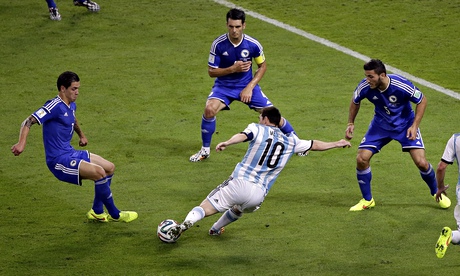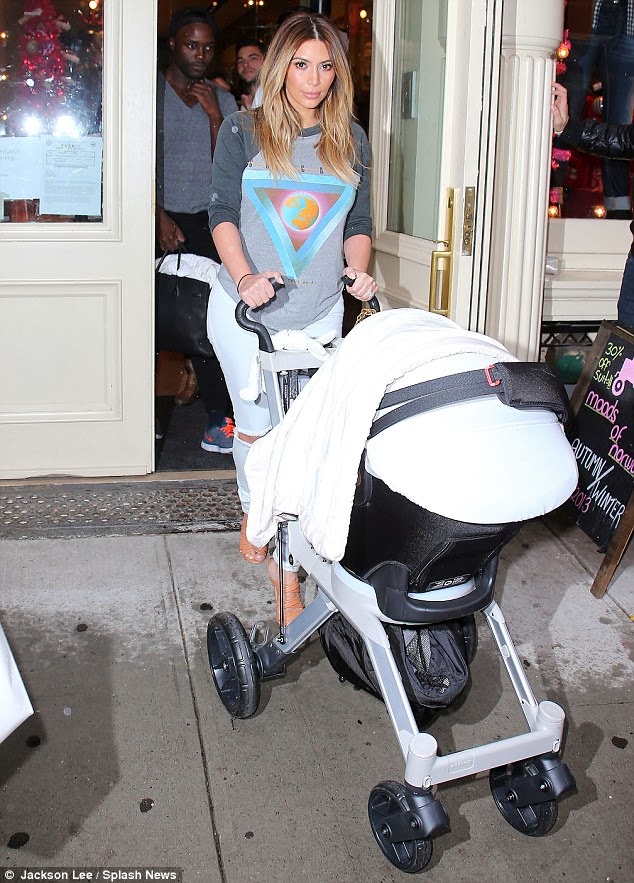Lionel Messi’s sparkle returns to secure Argentina victory over Bosnia

It was a winning start for Argentina but their victory was not
convincing even before a late Bosnia reply from Vedad Ibisevic. This was
a scratchy, scrappy performance that raised far more questions than it
answered against a disciplined and technically adept Bosnia side who
were undone first by a moment of misfortune three minutes in to their
first World Cup and then, as they tired in the second half, by a moment
of brilliance from Lionel Messi.
As expected, Argentina switched to a 5-3-2 from the 4-3-3 they used for much of qualifying, with Gonzalo Higuaín being replaced by Hugo Campagnaro. Higuaín was not fully fit which, with Rodrigo Palacio out with a calf injury, perhaps in part explained why Alejandro Sabella had made the change. But it still seemed baffling, particularly given that Bosnia, having used a 4-4-2 through most of qualifying, had spent their warm-up games preparing to use the 4-2-3-1 they did ultimately deploy. Sabella was a devotee of 5-3-2 when he led Estudiantes to the title and the Copa Libertadores but the danger of using three central defenders against a lone centre-forward is that, with two spare men, one is left redundant. Sabella had only heightened the sense of mystery by saying his selection was not to do with how he expected Bosnia to line up but “more with other things, but I can’t say what publicly”, prompting rumours about cliques and splits in the squad.
Thoughts of unease, though, were swiftly banished by an incident that had little to do with tactics. Messi floated in a free-kick from the left, Marcos Rojo flicked it on and the ball cannoned in off the unfortunate Sead Kolasinac. Before this tournament, the last Bosnian to kick a ball at a World Cup had been Faruk Hadzibegic, playing for Yugoslavia, who missed a decisive penalty in the shoot-out – against Argentina – at the end of the 1990 quarter-final. Given everything Bosnia has been through in the 24 years since, it seemed desperately cruel that the next decisive intervention, just three minutes into their World Cup debut as an independent nation, should be an own-goal.
Thereafter, though, the game settled into the shape the formations suggested it might, a pattern familiar to anybody who saw much of Sabella’s Estudiantes, with Bosnia controlling possession but struggling to find gaps in a packed Argentinian rearguard. When a chance did come, it was with a ball over the top from Zvjezdan Misimovic to Miralem Pjanic that Sergio Romero was only just off his line quickly enough to smother. Even that took a finely weighted pass and an awkward stretching first touch from two very fine technicians.
Argentina were solid rather than spectacular, which is Sabella’s way, but it still felt rather anti-climactic given both the potential of their forward line and the narrative of the tournament so far. Messi had the sort of game he has had a lot recently. It would be wrong to say he was peripheral in the first half, for Messi is never peripheral, his every touch shimmering with menace, but he certainly was not as dominant as he can be at his best, the attentions of Muhamed Besic forcing him to drop deep, which left Sergio Agüero at times rather isolated.
The 21-year-old Besic, who in 2010 replaced Pjanic as the youngest player to represent Bosnia, had a fine game, both screening his defence and distributing sensibly. He often played the short pass to Pjanic, but occasionally looking long to Senad Lulic on the left flank. He was offloaded by Hamburg to Ferencvaros in 2012 after an incident that led to the manager Thorsten Fink grabbing him by the throat. The suggestion is that he has tamed the more turbulent part of his personality since then and certainly his performance was one of impressive maturity.
After going behind, Bosnia had the better of it for an hour but as Misimovic’s legs went, so did their threat. There was one long-range Javier Mascherano shot that was beaten away by Asmir Begovic but that aside, the threat came from Bosnia. Much of it came in a general sense that they might be about to create something rather than anything more tangible – credit, perhaps, to the solidity of Argentina’s defending – but Senad Lulic forced a fine save form Romero with a low header from a right-wing corner four minutes before the break.
Sabella was worried enough to make two changes at half-time, Higuaín and Fernando Gago coming on for Campagnaro and Maxi Rodríguez as he reverted to 4-3-3. Still there was little fluidity. When Messi whipped a free-kick over 20 minutes into the second half, the largelyArgentinian crowd booed. A minute later, though, he scored, cutting in-field on to his left foot and firing a shot in off the post from the edge of the box for his second World Cup goal – eight years less a day after his first. It was needed, with the substitute Vedad Ibisevic squeezing a shot through Romero with five minutes remaining to cause Argentina late anxiety.
Both Messi and Argentina will have to be far sharper if they are to return to the Maracanã in four weeks for the final. For now, perhaps, the most important thing is that both Messi and his country are off the mark.
As expected, Argentina switched to a 5-3-2 from the 4-3-3 they used for much of qualifying, with Gonzalo Higuaín being replaced by Hugo Campagnaro. Higuaín was not fully fit which, with Rodrigo Palacio out with a calf injury, perhaps in part explained why Alejandro Sabella had made the change. But it still seemed baffling, particularly given that Bosnia, having used a 4-4-2 through most of qualifying, had spent their warm-up games preparing to use the 4-2-3-1 they did ultimately deploy. Sabella was a devotee of 5-3-2 when he led Estudiantes to the title and the Copa Libertadores but the danger of using three central defenders against a lone centre-forward is that, with two spare men, one is left redundant. Sabella had only heightened the sense of mystery by saying his selection was not to do with how he expected Bosnia to line up but “more with other things, but I can’t say what publicly”, prompting rumours about cliques and splits in the squad.
Thoughts of unease, though, were swiftly banished by an incident that had little to do with tactics. Messi floated in a free-kick from the left, Marcos Rojo flicked it on and the ball cannoned in off the unfortunate Sead Kolasinac. Before this tournament, the last Bosnian to kick a ball at a World Cup had been Faruk Hadzibegic, playing for Yugoslavia, who missed a decisive penalty in the shoot-out – against Argentina – at the end of the 1990 quarter-final. Given everything Bosnia has been through in the 24 years since, it seemed desperately cruel that the next decisive intervention, just three minutes into their World Cup debut as an independent nation, should be an own-goal.
Thereafter, though, the game settled into the shape the formations suggested it might, a pattern familiar to anybody who saw much of Sabella’s Estudiantes, with Bosnia controlling possession but struggling to find gaps in a packed Argentinian rearguard. When a chance did come, it was with a ball over the top from Zvjezdan Misimovic to Miralem Pjanic that Sergio Romero was only just off his line quickly enough to smother. Even that took a finely weighted pass and an awkward stretching first touch from two very fine technicians.
Argentina were solid rather than spectacular, which is Sabella’s way, but it still felt rather anti-climactic given both the potential of their forward line and the narrative of the tournament so far. Messi had the sort of game he has had a lot recently. It would be wrong to say he was peripheral in the first half, for Messi is never peripheral, his every touch shimmering with menace, but he certainly was not as dominant as he can be at his best, the attentions of Muhamed Besic forcing him to drop deep, which left Sergio Agüero at times rather isolated.
The 21-year-old Besic, who in 2010 replaced Pjanic as the youngest player to represent Bosnia, had a fine game, both screening his defence and distributing sensibly. He often played the short pass to Pjanic, but occasionally looking long to Senad Lulic on the left flank. He was offloaded by Hamburg to Ferencvaros in 2012 after an incident that led to the manager Thorsten Fink grabbing him by the throat. The suggestion is that he has tamed the more turbulent part of his personality since then and certainly his performance was one of impressive maturity.
After going behind, Bosnia had the better of it for an hour but as Misimovic’s legs went, so did their threat. There was one long-range Javier Mascherano shot that was beaten away by Asmir Begovic but that aside, the threat came from Bosnia. Much of it came in a general sense that they might be about to create something rather than anything more tangible – credit, perhaps, to the solidity of Argentina’s defending – but Senad Lulic forced a fine save form Romero with a low header from a right-wing corner four minutes before the break.
Sabella was worried enough to make two changes at half-time, Higuaín and Fernando Gago coming on for Campagnaro and Maxi Rodríguez as he reverted to 4-3-3. Still there was little fluidity. When Messi whipped a free-kick over 20 minutes into the second half, the largelyArgentinian crowd booed. A minute later, though, he scored, cutting in-field on to his left foot and firing a shot in off the post from the edge of the box for his second World Cup goal – eight years less a day after his first. It was needed, with the substitute Vedad Ibisevic squeezing a shot through Romero with five minutes remaining to cause Argentina late anxiety.
Both Messi and Argentina will have to be far sharper if they are to return to the Maracanã in four weeks for the final. For now, perhaps, the most important thing is that both Messi and his country are off the mark.


Comments
Post a Comment